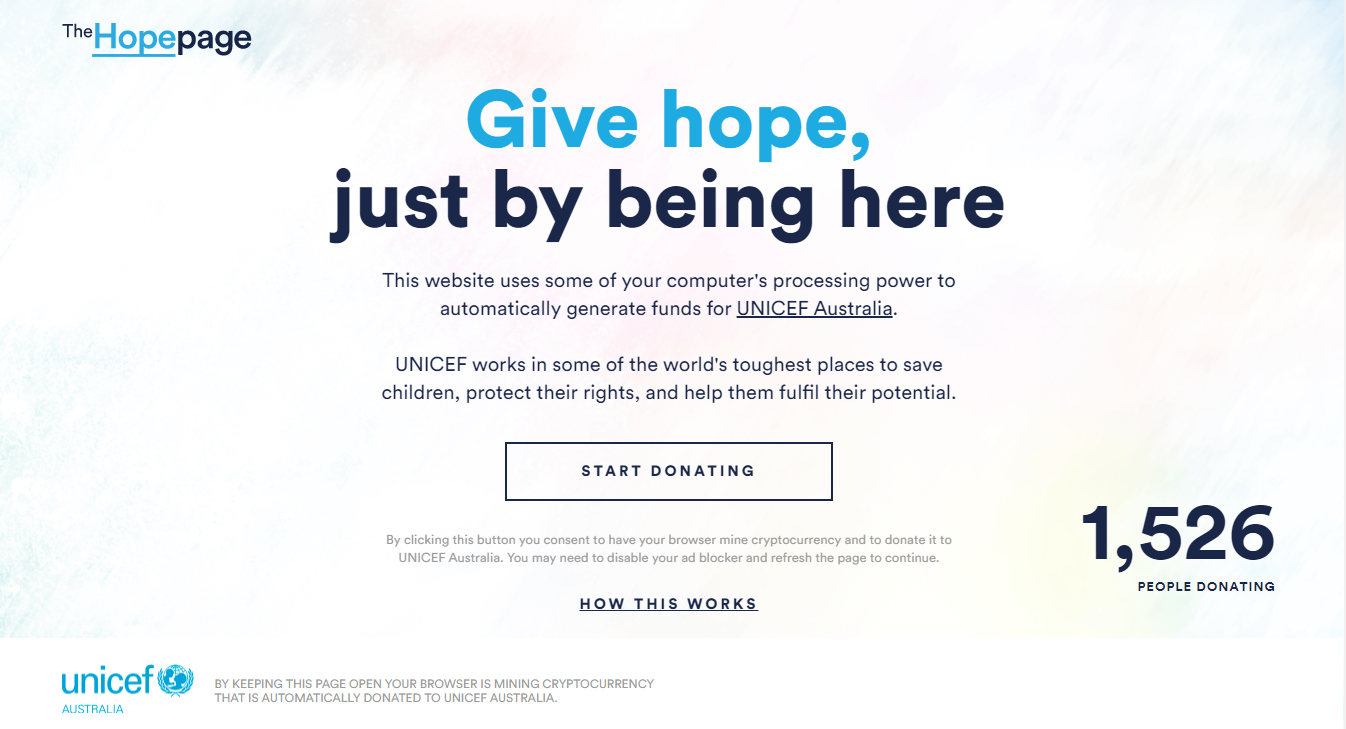Unicef Australia turns to cryptocurrency mining for fundraising

Unicef Australia has announced The Hopepage, a browser-based cryptocurrency mining platform that uses a third-party computer's processing power to automatically generate funds.
When on The Hopepage, an individual's browser uses the computer's processor to solve cryptocurrency algorithms -- users can select how much processor power they want to donate to the task.
The longer the browser is open, the more processor power is donated, which means more algorithms get solved, earning cryptocurrency.
special report
"Mining is perfectly safe for your computer. If you're ever worried about power consumption, turn down the amount of processing power you're donating," Unicef explains.
The cryptocurrency is then automatically donated to Unicef Australia and is turned into real funds that the organisation said reach children through supplies such as safe water, therapeutic food, and vaccines.
"We wanted to leverage new emerging technologies to raise awareness about current humanitarian crises and raise funds to support children caught up in them," Unicef Australia director of fundraising and communications Jennifer Tierney said. "The Hopepage allows Australians to provide help and hope to vulnerable children by simply opening the page while they are online."
The donation platform is powered by Coinhive's AuthedMine.com, which offers a Monero miner that can be embedded into other websites.
AuthedMine.com only allows a site to use a visitor's CPU after the user opts in.
Must read: Android security: Coin miners show up in apps and sites to wear out your CPU
Unicef is a global humanitarian and development agency focused on children's rights. Although it is the United Nations Children's Fund, Unicef is not funded by the UN; rather, it provides assistance from voluntary donations.
According to Unicef, The Hopepage is currently supporting the organisation's response to the Rohingya crisis. It said all funds raised through The Hopepage will help provide supplies to Rohingya children who fled their homes in Myanmar and are now living in refugee camps in Bangladesh.
RELATED COVERAGE
Nvidia wants GPUs reserved for those who need it, not those mining ether
The processing power Nvidia's GPUs are capable of has made them a useful tool for those dealing in ether, but the company's CEO would prefer the GPUs be kept for use in areas such as gaming or high-performance computing.
Alibaba pilots blockchain supply chain initiative down under
Blackmores and Fonterra have joined the pilot that will see products shipped to China from Australia and New Zealand in first trial of Alibaba's blockchain-based Food Trust Framework.
Webjet launches blockchain-as-a-service hotel distribution solution
The travel booking site has signed agreements with Thomas Cook, DidaTravel, Mitra Global, and hotel chain Far East Hospitality to solve account reconciliation pain points with its Rezchain blockchain solution.
Denmark considers blockchain a new weapon in the fight for human rights
The Ministry of Foreign Affairs of Denmark has highlighted the potential for cryptocurrency to be used to transfer aid in a way less susceptible to corruption.
Why more companies will be betting on Bitcoin in 2018 (TechRepublic)
Many organizations are still reluctant to trust blockchain technology, however others have found good use cases for it apart from Bitcoin.
Blockchain: A cheat sheet (TechRepublic)
This comprehensive guide covers everything you need to know about the innovative blockchain technology that powers Bitcoin, Litecoin, and other cryptocurrencies.
